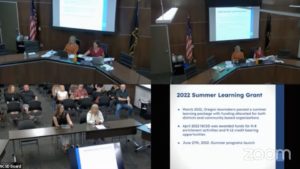Louisiana lawmaker wants to require schools to post class materials online
(The Center Square) – At least one Louisiana lawmaker wants to give parents a better understanding of what their children are learning in school.
State Rep. Lance Harris, R-Alexandria, has…

(The Center Square) – At least one Louisiana lawmaker wants to give parents a better understanding of what their children are learning in school.
State Rep. Lance Harris, R-Alexandria, has introduced House Bill 75 in advance of the regular legislative session that starts March 14. It would require public schools to post outlines of class materials and activities for students in a way parents easily can access the information online.
The bill states each public school governing authority shall prominently post on its website “a list of material and activities for each school under its jurisdiction, organized by school, subject area, grade level and teacher.
“The list shall include bibliographic information for each item, including the title and author of the material and the organization associated with an activity and its internet address, as applicable,” according to the bill.
HB 75 also would require the same procedure for “the full text or a digital version of any material or activity created by the public school governing authority or a teacher,” as well as “any policies and procedures for documentation, review, or approval of such materials and activities.”
The legislation would require the information to be posted by the first day of school and updated annually by Jan. 15, and for schools to notify parents each time it is updated through written communications.
The reference to “activity” in the bill refers to lectures, assemblies, presentations and other student instruction conducted by the school or “an outside individual or organization.”
The proposed law would apply to all public schools, including charter schools.
The bill comes amid a flood of complaints from public school parents nationwide regarding a wide range of issues, including critical race theory, graphic sexual books, sex education curriculums and other issues. Heated school board meetings in many states that centered on those issues and pandemic policies prompted the National School Boards Association in October to liken parent protests to “domestic terrorism” and seek intervention from the FBI and other federal law enforcement agencies.
Similar curriculum transparency proposals have been introduced in numerous states, including Pennsylvania, Ohio, Wisconsin, Minnesota, Iowa and Wyoming.
In states with Republican-controlled legislatures and Democrat governors, the latter have vetoed curriculum transparency bills citing the burden on schools to comply.
Pennsylvania Gov. Tom Wolf vetoed House Bill 1332 because he said state law already gives parents access to school materials through public information requests and described the bill’s requirement for posting online course materials as “not only duplicative, but overly burdensome.”
Wolf also insinuated nefarious motivations behind the effort.
“This legislation is a thinly veiled attempt to restrict truthful instruction and censor content reflecting various cultures, identities and experiences,” Wolf wrote in his veto message. “My Administration is committed to creating a safe learning environment for all students, and we will not take part in this dangerous and harmful imposition.”
In Wisconsin, Gov. Tony Evers, the former superintendent of public instruction, blamed the cost of complying with Senate Bill 463’s directive to post curriculum, lesson plans and assignments online for his veto.
“I object to the bill’s failure to provide the necessary funding to implement these measures,” Evers wrote in his veto message.



